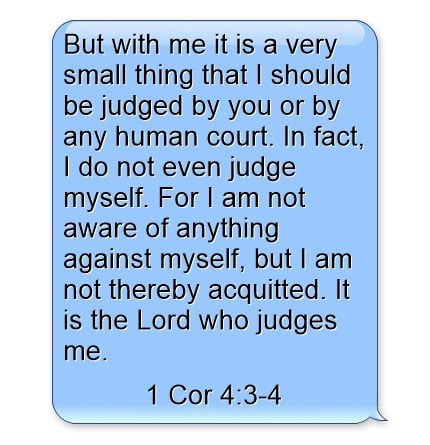Here are seven Bible verses for those who feel they are being unfairly judged.
First Corinthians 4:3-5 “But with me it is a very small thing that I should be judged by you or by any human court. In fact, I do not even judge myself. For I am not aware of anything against myself, but I am not thereby acquitted. It is the Lord who judges me. Therefore do not pronounce judgment before the time, before the Lord comes, who will bring to light the things now hidden in darkness and will disclose the purposes of the heart. Then each one will receive his commendation from God.”
The Corinthian church may have been the most carnal, or fleshly church of them all because the Apostle Paul kept writing about their boasting about their gifts and judging one another. Paul was saying it wasn’t a small thing at all to judge him because he didn’t even judge himself. Paul knew he had been acquitted when he trusted in Christ. His point was to leave judgment up to God for nothing’s hidden from Him and even the thoughts, intents, and motives of the human heart are like an open book to God (Heb 4:13) so we need not judge others.
Romans 14:4 “Who are you to pass judgment on the servant of another? It is before his own master that he stands or falls. And he will be upheld, for the Lord is able to make him stand.”
Paul points the judging question back to the Roman Christians. He asks them, “Who were they to judge,” because the person they’re passing judgment on is going to stand before God and not before them. God is able to make them stand and they will be upheld before God if they have repented and trusted in Christ. The point is, they will stand or fall before their own master, not before us.
John 7:24 “Do not judge by appearances, but judge with right judgment.”
How easy it is to judge by appearances…and most often, we judge wrongly. Only God can look into the human heart to judge someone (1st Sam 16:7). We don’t have that ability but we can judge the actions or fruits of others for evidence of conversion and there should be some evidence at least since “The old has passed away; behold, the new has come” (2nd Cor 5:17b). The point is that we should treat everyone we meet with respect and “not neglect to show hospitality to strangers, for thereby some have entertained angels unawares” (Heb 13:2).
Luke 6:42 “How can you say to your brother, ‘Brother, let me take out the speck that is in your eye,’ when you yourself do not see the log that is in your own eye? You hypocrite, first take the log out of your own eye, and then you will see clearly to take out the speck that is in your brother’s eye.”
Jesus was not teaching the disciples to not discipline a sinning brother because in fact that is just what He taught (Matt 18:15-21), but rather, if they had a greater sin in their own lives, what gave them the right to try and complain about a speck of sawdust in someone else’s eye? If we take the beam out of our own eye, we can see a lot better because the beam may blind us to our own faults and sins and thus, give us poorer vision in which to judge others.
Romans 2:1-4 “Therefore you have no excuse, O man, every one of you who judges. For in passing judgment on another you condemn yourself, because you, the judge, practice the very same things. We know that the judgment of God rightly falls on those who practice such things. Do you suppose, O man—you who judge those who practice such things and yet do them yourself—that you will escape the judgment of God? Or do you presume on the riches of his kindness and forbearance and patience, not knowing that God’s kindness is meant to lead you to repentance?”
Paul may be speaking to unbelievers as well as the genuine Christians in Rome, because then, just as now, the church is composed of a mixture of believers and unbelievers and so he appears to be writing to both groups. This may explain why he writes, it is “because of your hard and impenitent heart you are storing up wrath for yourself on the day of wrath when God’s righteous judgment will be revealed” (Rom 2:5) but we know that “God has not destined us for wrath, but to obtain salvation through our Lord Jesus Christ” (1st Thess 5:9). Jesus said there would be tares growing up alongside the wheat and not to pluck them out, lest they take some of the wheat (Matt 13:29). Paul’s point is to leave judgment up to God but it’s far worse for those who judge others for what they themselves are doing (Rom 2:3).
Luke 6:43-44 “For no good tree bears bad fruit, nor again does a bad tree bear good fruit, for each tree is known by its own fruit. For figs are not gathered from thornbushes, nor are grapes picked from a bramble bush”
If you’ve ever read 1st John chapter 3, it might make you might think about Luke chapter 6 because their message is very similar. For one thing, the mouth reveals what’s in the heart. Words are like buckets drawn from the cistern of the human heart and it’s either sweet, refreshing water or bitter cisterns that are harmful to drink. Jesus tells us that “The good person out of the good treasure of his heart produces good, and the evil person out of his evil treasure produces evil, for out of the abundance of the heart his mouth speaks” (Luke 6:45).
Romans 14:12-13 “So then each of us will give an account of himself to God. Therefore let us not pass judgment on one another any longer, but rather decide never to put a stumbling block or hindrance in the way of a brother.”
On the day of our death, having previously repented and trusted in Christ, we’ll receive our rewards from Christ Himself. For those who have never believed, Paul wrote to them then, and he writes to those today, that it was “because of your hard and impenitent heart you are storing up wrath for yourself on the day of wrath when God’s righteous judgment will be revealed” (Rom 2:5) and most certainly, “He will render to each one according to his works” (Rom 2:6).
Conclusion
If you have been unfairly judged, then don’t feel bad. You are not alone. Many people judge us by what they see or by what they hear us say or write, or by what others say, but God alone knows our heart and His opinion is the only one that counts. If you’ve trusted in Christ, you shouldn’t care what the world thinks. Rather, think about those who are judging you who are not yet saved. Their judgment is abiding on them right now (John 3:18, 36b), therefore you must warn them of the wrath to come. The greatest act of love is to be willing to be hated, scorned, called names, and despised in order that some might be saved from the coming wrath of God that is coming upon all unrepentant sinners (Rev 21:8).
Article by Jack Wellman
Jack Wellman is Pastor of the Mulvane Brethren Church in Mulvane Kansas. Jack is also the Senior Writer at What Christians Want To Know whose mission is to equip, encourage, and energize Christians and to address questions about the believer’s daily walk with God and the Bible. You can follow Jack on Google Plus or check out his book Teaching Children the Gospel available on Amazon.















